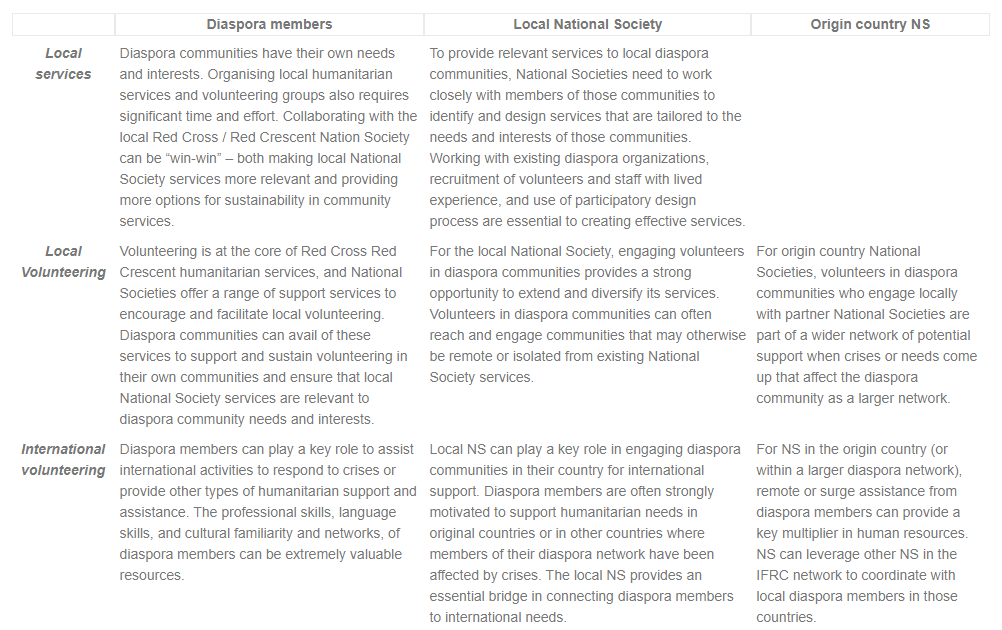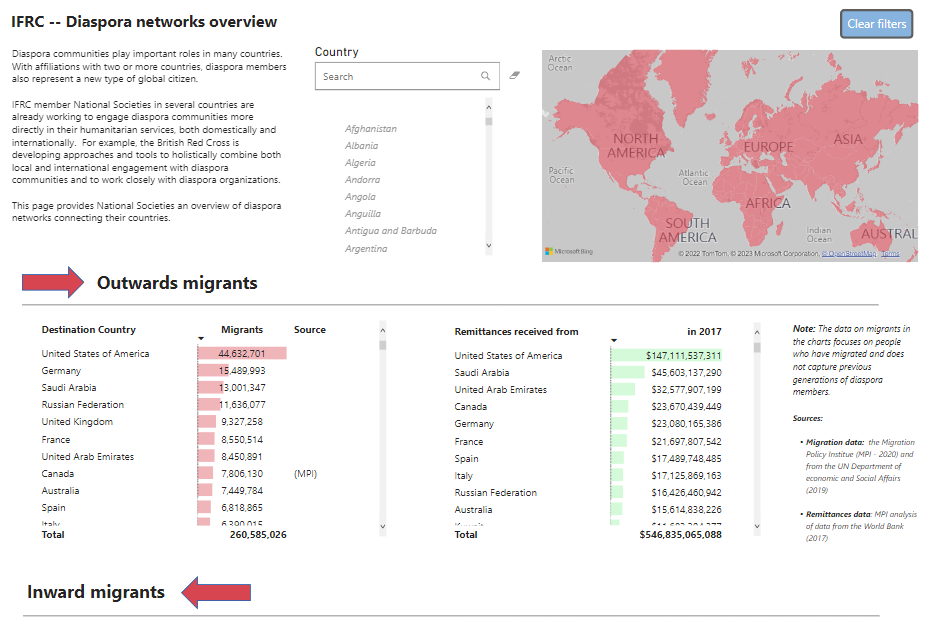Exploring these ideas further, the British Red Cross is currently leading a project to use participatory design activities with diaspora communities to design relevant British Red Cross services, community engagement and volunteering opportunities that build on diaspora communities’ own interests to organize and provide humanitarian services both locally and internationally (e.g., in countries of origin or other countries within a diaspora network).
At the same time, diaspora communities in other countries can be an important source of expertise, community action, and fundraising support to NS in origin counties. For example, to support an emergency appeal (e.g., the current Africa Hunger Crisis), National Societies in origin countries could identify the partner National Societies with large diaspora from those origin countries could be asked to reach out to embassies of origin counties together on a fundraising outreach with diaspora groups. The IFRC network could also approach African country consulates in Geneva (or in other coordinated fashion) to see if they would help engage their counterparts in partner National Society countries.
Click on the ‘Suggested Actions’ tab or the ‘Diaspora networks map’ tab, to get more ideas about how and where National Societies can engage diaspora communities.
 |
 |
Next steps
- Collaborate with British Red Cross to explore country-level diaspora mapping to further refine the available data
- Update existing datasets to include 2019 World Bank data on remittances and to match year between migration and remittances data.
- Integrate population data to give a % of migrants to country population to add further context.
Other resources
- IOM’s Diaspora Mapping Toolkit
- DEMAC’s mapping of diaspora organizations
Here is a short list of actions that stakeholders within the IFRC network and within local communities can take:
| Diaspora members | Local National Society | Origin country National Society | |
|---|---|---|---|
| Local services | Diaspora communities have their own needs and interests. Self-organising local humanitarian services and volunteering groups can be effective but also requires significant time and effort. Collaborating with the local Red Cross / Red Crescent Nation Society can be “win-win” – both providing more options for sustainability in community services and making local National Society services more relevant. | To provide relevant services to local diaspora communities, National Societies need to work closely with members of those communities to identify and design services that are tailored to the needs and interests of those communities. Working with existing diaspora organizations, recruitment of volunteers and staff with lived experience, and use of participatory design process are essential to creating effective services. | Origin country National Societies may not have a direct role in local services in diaspora member’s local communities, but there can sometimes be synergies to jointly produce outreach materials with diaspora communities that can also be used in the origin countries (e.g., materials produced in relevant languages and tailored to shared social dynamics). |
| Local Volunteering | Volunteering is at the core of Red Cross Red Crescent humanitarian services, and National Societies offer a range of support services to encourage and facilitate local volunteering. Diaspora communities can avail of these services to support and sustain volunteering in their own communities and ensure that local National Society services are relevant to diaspora community needs and interests. | For the local National Society, engaging volunteers in diaspora communities provides a strong opportunity to extend and diversify its services. Volunteers in diaspora communities can often reach and engage communities that may otherwise be remote or isolated from existing National Society services. | For origin country National Societies, volunteers in diaspora communities who engage locally with partner National Societies can be part of a wider network of potential support when crises or needs come up that affect the diaspora community as a larger network. |
| International volunteering | Diaspora members can play a key role to assist international activities to respond to crises or provide other types of humanitarian support and assistance. The professional skills, language skills, and cultural familiarity and networks, of diaspora members can be extremely valuable resources. | Local NS can play a key role in engaging diaspora communities in their country for international support. Diaspora members are often strongly motivated to support humanitarian needs in original countries or in other countries where members of their diaspora network have been affected by crises. The local NS provides an essential bridge in connecting diaspora members to international needs. | For NS in the origin country (or within a larger diaspora network), remote or surge assistance from diaspora members can provide a key multiplier in human resources. NS can leverage other NS in the IFRC network to coordinate with local diaspora members in those countries. |
| International fundraising | In addition to support local needs and services, diaspora communities are often strongly interested to support humanitarian needs in origin countries (or in other countries within diaspora networks). Working with their local National Society and the National Society in the origin country can be a good way to ensure coordination and synergy with other related humanitarian activities and to support local sustainability and capacity. | Coordinating fundraising support for humanitarian needs within origin countries (or elsewhere within diaspora networks) can be an important way for local National Societies to recognize and respond to the multi-country affiliations of diaspora communities. Pairing local and international support is a key element for local National Societies to respond to diaspora community needs and interests. | Diaspora communities in other countries can be an important source of expertise, community action, and fundraising support to NS in origin counties. National Societies in origin countries can identify the partner National Societies with large diaspora from those origin countries. National Societies in origin countries can also work with partner National Societies to reach out to embassies of origin counties together on fundraising outreach with diaspora groups. The IFRC network can also help to make these connections in a coordinated fashion across multiple countries within diaspora networks. |
| Other |